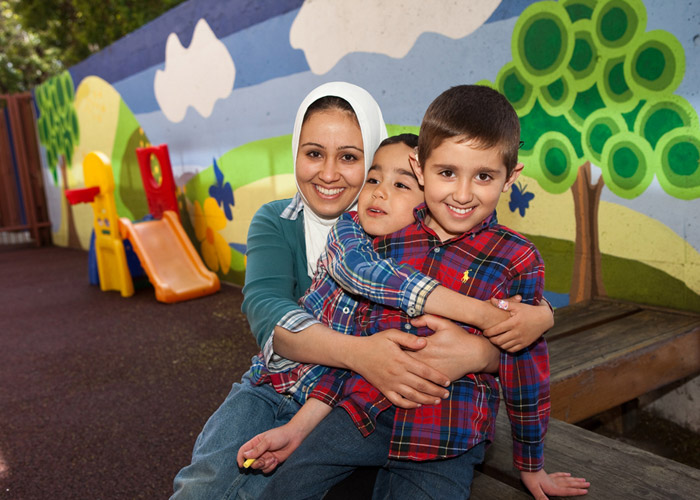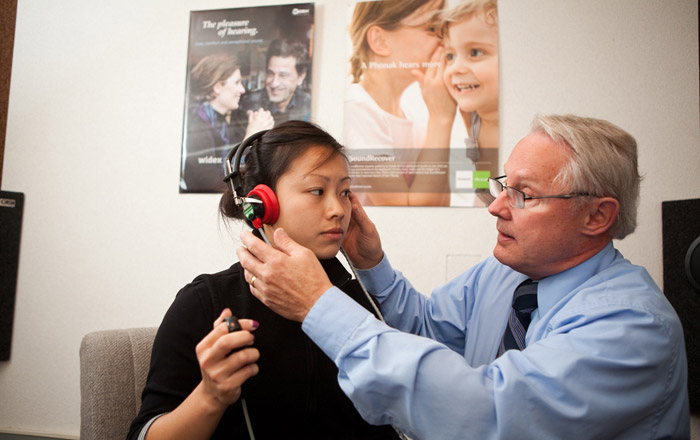Pediatric Hearing Services
Pediatric Hearing Services

Hearing loss can and will significantly impact a child’s life. Here at the Center, our audiologists, speech-language pathologists, counselors, and educators are intimately familiar with hearing loss; some of us have it ourselves, some of us have now-grown children who were born with profound hearing loss, and others of us have close friends and family members who are Deaf/Hard-of-Hearing. Our staff strongly believes in a family-centered and positive approach to the management of your child’s hearing loss. It is our goal to enable your child to do and be anything and everything she or he desires.
Part of reaching this goal is educating you as a parent about hearing loss and its related implications if left unmanaged. And while your child is not defined by their hearing loss, it is very important to understand the Effects of Hearing Loss On Development. The American Speech-Language-Hearing Association has organized them into these four categories:
- Speech/Language: Delays in the development of receptive and expressive language.
- Academics: Language difficulties and reduced hearing in the classroom can contribute to reduced academic achievement.
- Social functioning: Communication difficulties can lead to isolation and poor self-concept.
- Vocational choices: The above categories may limit career path.
As you can see, hearing loss has serious effects on a child’s development. However, early, family-centered intervention with a multidisciplinary team of professionals can promote language and cognitive development for your child, as well as prepare you to address the implications. It is our job at the Center to help you and your child to do this in order to shatter any perceived and/or real limitations or barriers. Here are some more detailed approaches to ensure that your child reaches the appropriate development stages:
- Ensure that a child has the opportunity to fully participate in the environment by providing communication access auditorally or visually.
- Inform families about development milestones
- Provide tools for the child, family and educators to develop good communication skills, including the usage of amplification
- Encourage the development of appropriate social skills
- Educate caregivers and other family members on creating positive and successful experiences when the child attempts new skills
Hearing Testing for Children

Reasons for Referral
Children are often referred for a hearing test after failing a hearing screening at the pediatrician’s office or at school. Other reasons for referral include speech and language delay, a family history of congenital hearing loss, risk factors for hearing loss (e.g., certain medications, genetic disorders, syndromes), recurring middle ear infections, and concerns about academic achievement.
What to Expect on Test Day
You will be asked to complete an intake and case history form at check-in. Please be prepared to discuss the following topics with the audiologist: pregnancy and birth history, results of newborn hearing screening, developmental milestones, past and current health status and medication use, familial hearing loss history, and any teacher concerns.
Hearing can be assessed at any age. No child is too young to have a full hearing assessment. Below are the tests we use to assess your child’s hearing. Sometimes we are able to complete all of the age-appropriate tests in one visit but often times, depending on age and cooperation, multiple visits are required. We try to make this time as fun for your child as possible! Please feel free to bring snacks and favorite toys to help comfort and relax your child.
- Otoscopy: For children of all ages. A visual examination of the ear canal and ear drum using a lighted device called an otoscope.
- Tympanometry: For children of all ages. A probe is placed in the ear canal to record movement of the ear drum, which is used to identify middle ear dysfunction (e.g., fluid behind the eardrum).
- Otoacoustic Emissions: For children of all ages. A probe is placed in the ear canal to measure the inner ear’s response to sound.
- Visual Reinforcement Audiometry: For children ages 6 months – 2.5 years. You and your child sit in a sound booth between two large speakers. The audiologist observes your child’s responses to speech and sounds representing different pitches, either presented through the speakers or through headphones if your child will wear them. Your child’s responses are reinforced with lighted toys and cartoons.
- Conditioned Play Audiometry: For children ages 2.5-6 years. Testing takes place in a sound booth, most often with your child listening to speech and sounds through headphones. Your child will engage in a series of “listening games” while the audiologist records the levels at which sounds are heard. Your child may be asked to identify pictures in a book or repeat back words at varying intensity levels.
- Conventional Audiometry: For older children and teens. Sounds representing a broad frequency range are presented through headphones. The patient raises their hand or presses a button upon hearing a sound, and the audiologist records the softest level at which sounds are heard. The patient is also instructed to repeat back monosyllabic recorded words, most often at a set intensity level, while the audiologist scores the number of words correctly repeated back.
After testing is complete, the audiologist will be able to describe the status of your child’s hearing. If hearing loss is indicated, you will be given full information regarding appropriate steps for follow-up. You will also be referred to our family counselors so that they may offer support.
Teens Living with Hearing Loss
We all know that the teenage years can be a struggle: it is a time of identity confusion, rebellion, dramatic physical change, and the tumultuous emotions that accompany all of this. It is also an exciting time in which an individual comes of age and discovers who they are.
Youth with hearing loss face a unique set of barriers due to a lack of common knowledge and understanding about hearing loss in society. Therefore, it is a critical time to provide support, guidance and opportunities for them to succeed.
Some common issues youth with hearing loss face are
- Identity confusion. Youth with hearing loss may have a hard time understanding where they fit in with peers, especially if they are exposed only to hearing peers. They may ask themselves: “Am I Deaf? Hearing? Or in between…If so, what does that mean?”… or “Am I the only one?”
- Academic challenges. Students with hearing loss may fall behind in school because they can miss information and disengage from class discussions. The hearing loss makes it difficult to take notes and listen at the same time, or catch every bit of cross talk, so students have to work extra hard to keep up.
- Depression or low self- esteem. Again, this is a common experience for many teens, but some youth with hearing loss might feel frustrated by the sense of being ‘different.’ This can lead to social isolation, withdrawal and other symptoms of depression.
Our Center works to prevent these issues and to support youth and families who face these struggles. We are proud of our youth program which creates a positive and supportive community where our wonderful youth can thrive and feel a sense of belonging.
Culturally Competent Services
The Center staff has extensive experience working with families of varying backgrounds and cultures. Our client coordinators, counselors, and audiologists offer services in American Sign Language, Chinese (Cantonese and Mandarin), French, English, and Spanish. While we do our best to match you with a staff member who speaks your child’s primary language, it is your responsibility to bring a translator to your child’s appointment if necessary.
